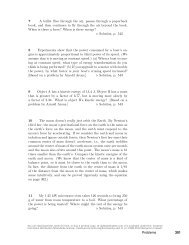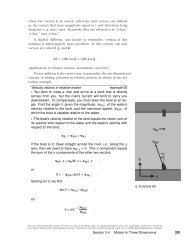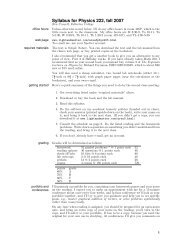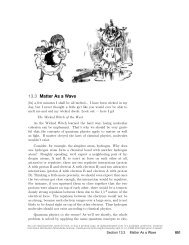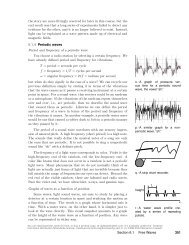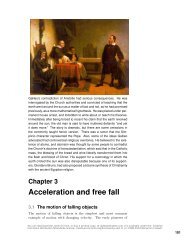Chapter 1 Conservation of Mass - Light and Matter
Chapter 1 Conservation of Mass - Light and Matter
Chapter 1 Conservation of Mass - Light and Matter
You also want an ePaper? Increase the reach of your titles
YUMPU automatically turns print PDFs into web optimized ePapers that Google loves.
92 <strong>Chapter</strong> 2 <strong>Conservation</strong> <strong>of</strong> Energy<br />
How long does it take to move 1 meter at a constant speed <strong>of</strong> 1 m/s?<br />
If we do this,<br />
>>> print(time1(1.0,1.0,10)) # dist, v, n<br />
0.99999999999999989<br />
Python produces the expected answer by dividing the distance into<br />
ten equal 0.1-meter segments, <strong>and</strong> adding up the ten 0.1-second<br />
times required to traverse each one. Since the object moves at constant<br />
speed, it doesn’t even matter whether we set n to 10, 1, or a<br />
million:<br />
>>> print(time1(1.0,1.0,1)) # dist, v, n<br />
1.0<br />
Now let’s do an example where the answer isn’t obvious to people<br />
who don’t know calculus: how long does it take an object to fall<br />
through a height h, starting from rest? We know from example 8<br />
on page 83 that the exact answer, found using calculus, is � 2h/g.<br />
Let’s see if we can reproduce that answer numerically. The main<br />
difference between this program <strong>and</strong> the previous one is that now<br />
the velocity isn’t constant, so we need to update it as we go along.<br />
<strong>Conservation</strong> <strong>of</strong> energy gives mgh = (1/2)mv 2 +mgy for the velocity<br />
v at height y, so v = − � 2g(h − y). (We choose the negative root<br />
because the object is moving down, <strong>and</strong> our coordinate system has<br />
the positive y axis pointing up.)<br />
1 import math<br />
2 def time2(h,n):<br />
3 g=9.8 # gravitational field<br />
4 y=h # Initialize the height.<br />
5 v=0 # Initialize the velocity.<br />
6 dy = -h/n # Divide h into n equal parts.<br />
7 t=0 # Initialize the time.<br />
8 for i in range(n):<br />
9 y = y+dy # Change y. (Note dy>> print(time2(1.0,10)) # h, n<br />
0.35864270709233342








